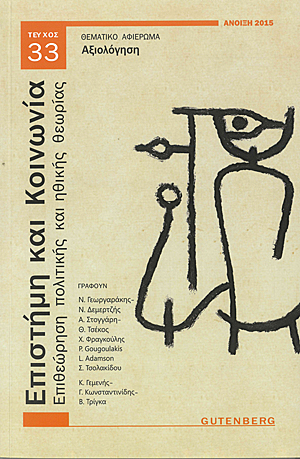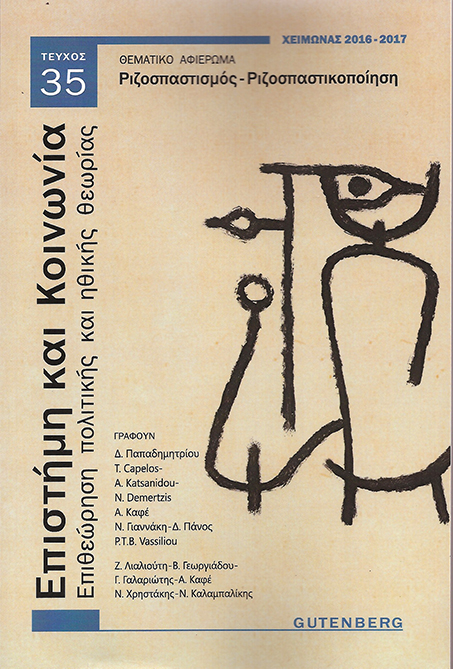Populism and ressentiment: A contribution of the (political) sociology of emotions
Abstract
As a political phenomenon, populism has been considerably studied in comparative politics and political sociology. Particular attention was given to its structural, ideological and discursive aspects but very little, not to say any, to its emotional bases. In Greece populism was thoroughly debated at the turn of the ’90s mainly, as a consequence of Papandreou’s ‘populist decade’. Recently, however, some academic interest is directed to it.
After discussing the relevance of emotions in the understanding of populism, the paper looks at the Greek case through a political sociology of emotion perspective using principally Max Scheler’s phenomenology of ressentiment. It argues that the rise of the Greek Socialists (PASOK) was buttressed, if not driven, by an array of emotions typical of populations undergoing rapid upward social mobility: repressed vindictiveness and vengeance, spite, envy and ressentiment. PASOK was heavily supported by new middle strata with origins to the defeated of the civil war (1946-49). Although they were more or
less integrated socially and economically, until mid 70s they were politically marginalized and dominated. As an effect, according to the authors’ hypothesis, for more than twenty years they were resentful against the post civil war ‘establishment’. This ressentiment came from the conflict between desire (political inclusion and full fledged citizenship) and impotence (political losers with repressed vindictiveness) and served as the social psychological basis for the nurturing of Greek populism in the 1980s. Its anti- intellectualism and exaltation of the ‘people” are examples of the transvaluation of social hierarchies, which according to Scheler is produced by long standing ressentiment. Surely, throughout this period (1950-1974) envy and spite were also evident and going occasionally hand in hand with ressentiment which was, nevertheless, a widely widespread emotion among the less privileged part of the population.
As soon as PASOK took office in 1981 and middle strata found themselves integrated into political system, ressentiment gave place to vengeance precisely because it could be released and acted out publicly.
Article Details
- How to Cite
-
Δεμερτζής Ν. (2015). Populism and ressentiment: A contribution of the (political) sociology of emotions. Science and Society: Journal of Political and Moral Theory, 12, 75–114. https://doi.org/10.12681/sas.768
- Section
- Articles

This work is licensed under a Creative Commons Attribution-NonCommercial-ShareAlike 4.0 International License.
Authors who publish with this journal agree to the following terms:- Authors retain copyright and grant the journal right of first publication with the work simultaneously licensed under a Creative Commons Attribution-NonCommercial-ShareAlike License that allows others to share the work, not for commercial purposes, with an acknowledgement of the work's authorship and initial publication in this journal. If you remix, transform, or build upon the material, you must distribute your contributions under the same license as the original.
- Authors are able to enter into separate, additional contractual arrangements for the non-exclusive distribution of the journal's published version of the work (e.g., post it to an institutional repository or publish it in a book), with an acknowledgement of its initial publication in this journal.
- Authors are permitted and encouraged to post their work online (e.g., in institutional repositories or on their website) prior to and during the submission process, as it can lead to productive exchanges, as well as earlier and greater citation of published work (See The Effect of Open Access).









